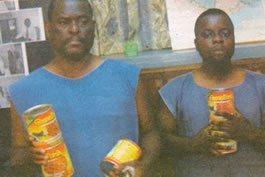Many moons after ships festinated the Atlantic Ocean loaded with slaves from West Africa destined for South America as part of a three-way trade with Europe, another type of trade is flourishing amongst these good-old partners, only this time it is a reverse triangular trade with another cargo: cocaine destined for Europe.
A grim reality is the recent bust of a Liberian-registered ship, Blue Atlantic, by the French navy some 550 kilometres off the West African shore on January 31 2008. A swift raid of the ship revealed 2.4 tonnes of pure cocaine, making it one of the biggest interceptions of a drug-laden ship made in the Atlantic waters of West Africa following increased patrols by European navies in recent years. Unfortunately, life’s many slip twixt cup and lip proved an enemy to their progress. According to French and Liberian security operatives, the ship which had an all-Ghanaian crew was headed for Nigeria and it would have been a massive jackpot for the merchandisers had the ship not developed mechanical faults just as it was completing the Atlantic passage. Distress calls by the ship’s crew were intercepted by the French navy, which then located and took the ship to Liberia, whose flag it was flying.Diplomatic pressure mounted by Western countries on the Nigerian government in the mid-80s resulted in a massive crackdown by a coalition of Nigerian police and US Drug Enforcement Administration (DEA) on drug traffickers in that country resulting in a mass migration of drug dealers in that country to other countries in West Africa where law enforcement is more lax such as Ghana, Benin, Guinea-Bissau, Cote d’Ivoire and Senegal.
The relatively short distances between West Africa and South America, coupled with the successes of security agencies in disabling drug cartels in Europe and, scaring the living daylights out of mini-barons in the Caribbean has made West Africa a more efficient transit route for drugs destined for Europe. This condemnable phenomenon has serious implications for Ghana, the foremost of which is security. Security experts fear the drug trade consolidates the arms trade thus placing Ghana in a perilous position of security breakdown in an already volatile region. The recent admission by a Minister of State, that there exists miniature cocaine and heroin refineries in Ghana should raise eyebrows. The seizure of sophisticated weapons in frightening quantities by Ghana’s security apparatus and the rising rate of armed robbery and murder-for-hire in recent times means these vessels are carrying not only smuggled narcotics but also smuggled guns. Unavoidably, some of the proceeds generated from the narcotic trade are invested in guns and likewise, capital from gun-running is being used to bankroll the drug business, with increasing concerns that some of the violent crimes in the country are motivated by drug habits. A recent publication by The United Nations Office on Drugs and Crime (UNODC) reports, that the upsurge in drug-trafficking in West Africa has led to an amplification in drug use amongst West Africans. This, surely, has serious implications for the region’s fight against HIV/AIDS. Drug use, with its concomitant effects of needle-sharing and alcohol consumption, as well as dangers posed by sexually transmitted infections, has led to a rise in the HIV infection rate.
Ours is a frangible democracy and government cannot afford to be indifferent towards the new “Ghanaian Leviathan”. The scale of the problem is more grave than we imagine as drug smuggling is also blossoming on the seaways to Europe, which means the statistics regarding Africa can be illusory, due to the fact that a great proportion of the smuggled drugs remain undiscovered. Data gathered for the first nine months of 2007 by the UNODC indicated an eloquent jump to a record 5.7 metric tonnes of cocaine seized in the region, with a street value of nearly US$500 million.
Additionally, Ghana runs the risk of plunging herself into the “twin inseparability phenomena” with cocaine enjoying a symbiotic relationship with our national economy vis-à-vis the formal and informal sectors, as exists in most South American economies, where the coca fields function as the nexus that unites all aspects of their peasant lives and forms a transcendent symbol of social values. Even now, our legal economy appears impalpable from the drug business with increasing rumours of government involvement in the illicit trade. This perception threatens a democracy such as ours, which is still in its foundation stages.
Ghana’s narco-dilemma calls for a “geonarcotics” framework in identifying the routes commonly used by the drug couriers in infiltrating our country. I doubt this is possible, amid growing concerns that trop brass of law enforcement connive with drug traffickers to guarantee easy passage. Also, government through the rule of law needs to set a deterrent by dealing drastically with government officials and security agents who are found guilty of any involvement in the drug business regardless of the convicted person’s political leaning. With the rising incidence of corruption amongst administrators and politicians, a perfect environment is being watered for the criminal machinery that cocaine smugglers use to carry out their logistics. The relative silence by the NPP on the recent conviction of ex-MP Amoateng in the USA, as well as the hanging status of ACP Boakye as a result of his alleged involvement in drug trafficking leaves much to be desired and paints a picture of “I-am-afraid-to-speak-lest-my-cover-is-blown”.
This year promises an acid test for our democracy and issues such as these leave many Ghanaians fraught with a feeling of alarm and dread. Perhaps we need a transformation of the megaphone deterrents into real action. Needless to say, we do not have to wait for a Liberia, Sierra Leone or Kenya before instituting measures to tackle this canker.




















